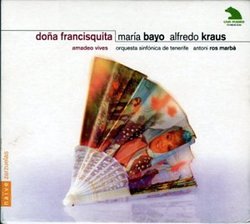| All Artists: Amadeo Vives, Antoni Ros-Marba, Tenerife Symphony Orchestra, Maria Bayo, Alfredo Kraus, Raquel Pierotti, Maria Dolores Coello, Esther Alfonso Da Costa, Alfonso Echeverria, Neftali Arvelo Fernandez, Manuel Cristobal Fornell, Marisa Gonzalez Gonzalez, Mercedes Aleman Herrera, Santiago S. Jerico, Maria Luisa Maesso, Jose Manzaneda, Javier Medina, Carlos Javier Mendez, Ismael Pons-Tena, Beatriz Gonzalez Ramos Title: Amadeo Vives: Dona Francisquita Members Wishing: 0 Total Copies: 1 Label: Valois Original Release Date: 1/1/2003 Re-Release Date: 8/19/2003 Genre: Classical Style: Opera & Classical Vocal Number of Discs: 2 SwapaCD Credits: 2 UPC: 709861048939 |
Search - Amadeo Vives, Antoni Ros-Marba, Tenerife Symphony Orchestra :: Amadeo Vives: Dona Francisquita
 | Amadeo Vives, Antoni Ros-Marba, Tenerife Symphony Orchestra Amadeo Vives: Dona Francisquita Genre: Classical ![header=[] body=[This CD is available to be requested as disc only.]](/images/attributes/disc.png?v=a4e11020) ![header=[] body=[This CD is available to be requested with the disc and back insert.]](/images/attributes/disc_back.png?v=a4e11020) ![header=[] body=[This CD is available to be requested with the disc and front insert.]](/images/attributes/disc_front.png?v=a4e11020) ![header=[] body=[This CD is available to be requested with the disc, front and back inserts.]](/images/attributes/disc_front_back.png?v=a4e11020) |
Larger Image |
CD Details |
CD ReviewsIf THIS is Zarzuela, Count Me In! J Scott Morrison | Middlebury VT, USA | 10/31/2003 (5 out of 5 stars) "I know nothing about zarzuela, that Spanish light opera that is so popular in Hispanic countries and next to uknown elsewhere. I ran across a recent Naxos release, 'Preludes and Choruses from Zarzuela,' and was smacked between the eyes. So when this release came my way I pricked up my ears. Amadeo Vives's 'Doña Francisquita' is accounted by many to be the best zarzuela ever written. I wouldn't know; but I do know that this music is infectious. This recording is a re-release of a 1993 Valois label recording starring the classiest of Spanish tenors, Alfredo Kraus, and María Bayo, a crystalline-voiced soprano. Kraus was sixty-five when he recorded it, but aside from some wear in the voice and a little uncertainty at high volume, his singing is as elegant as ever. The whole production is under the direction of conductor Antoni Ros Marbà, with chorus and orchestra from Tenerife. I won't recount the story of the piece. It's a fairly typical romantic comedy with misunderstandings, comic bits, open-faced romantic songs. It has something I don't think I've encountered before in opera--a pants-role-in-reverse. I guess one could call it a 'skirt role.' The hero, Fernando, has a best friend, Cardona, and from the middle of Act II on he is dressed as a very attractive woman. Well, I guess if Leonore can be Fidelio, I guess Cardona can be a vamp who attracts all kinds of male attention. Several points about this recording. Zarzuela, like much operetta, Singspiel and opéra comique, has spoken dialog. It has been omitted in this Spanish-language production, which is just as well for us non-Hispanophones. This makes for an uninterrupted parade of choruses, dances, arias, duos, all with infectious tunes that, I promise you, will stay in your inner ear for hours or days. I was affected that way particularly by Francisquita's 'Canción del ruiseñor' ('Song of the Nightingale') in which she imitates the song of the nightingale and is joined in a juicy duet by Fernando. Similarly, Fernando's ballad 'Por el humo se sabe' ('From the smoke we know where there is fire'), sung beautifully by Kraus, has a vaulting romantic feel. Not surprisingly Spanish rhythms abound, as in the students' rousing 'Cuando un hombre se quiere casar' ('When a man wants to marry') in Act I and the instrumental Fandango in Act III. Not being that familiar with Spanish vocal music, I had never realized how much the sound and accentuation of the Spanish language determine what we think of as typically Spanish rhythms. Further, it must be said that surely Spanish is one of the most beautiful of sung languages, on a par with Italian and Russian; it's all those open vowels, allowing for full-throated singing. Finally, Carlos Gómez Amat's essay about zarzuela in general and 'Doña Francisquita' in particular is very helpful to a neophyte, even if its English translation is a little unidiomatic. The history of the form is briefly recounted and a description of the form is neatly laid out. Last week a recording of Puccini's 'Edgar' (from the same recording label) rarely left my CD player, and this week it's been the insinuating melodies and rhythms of 'Doña Francisquita.' It's been a good two weeks!I understand there was a prior recording of 'Doña Francisquita' starring Plácido Domingo but I've not encountered it.Recommended for those, otherwise unfamiliar with the genre, who think they might like dipping their toe into the vast sea of Zarzuela. Scott Morrison"
|
